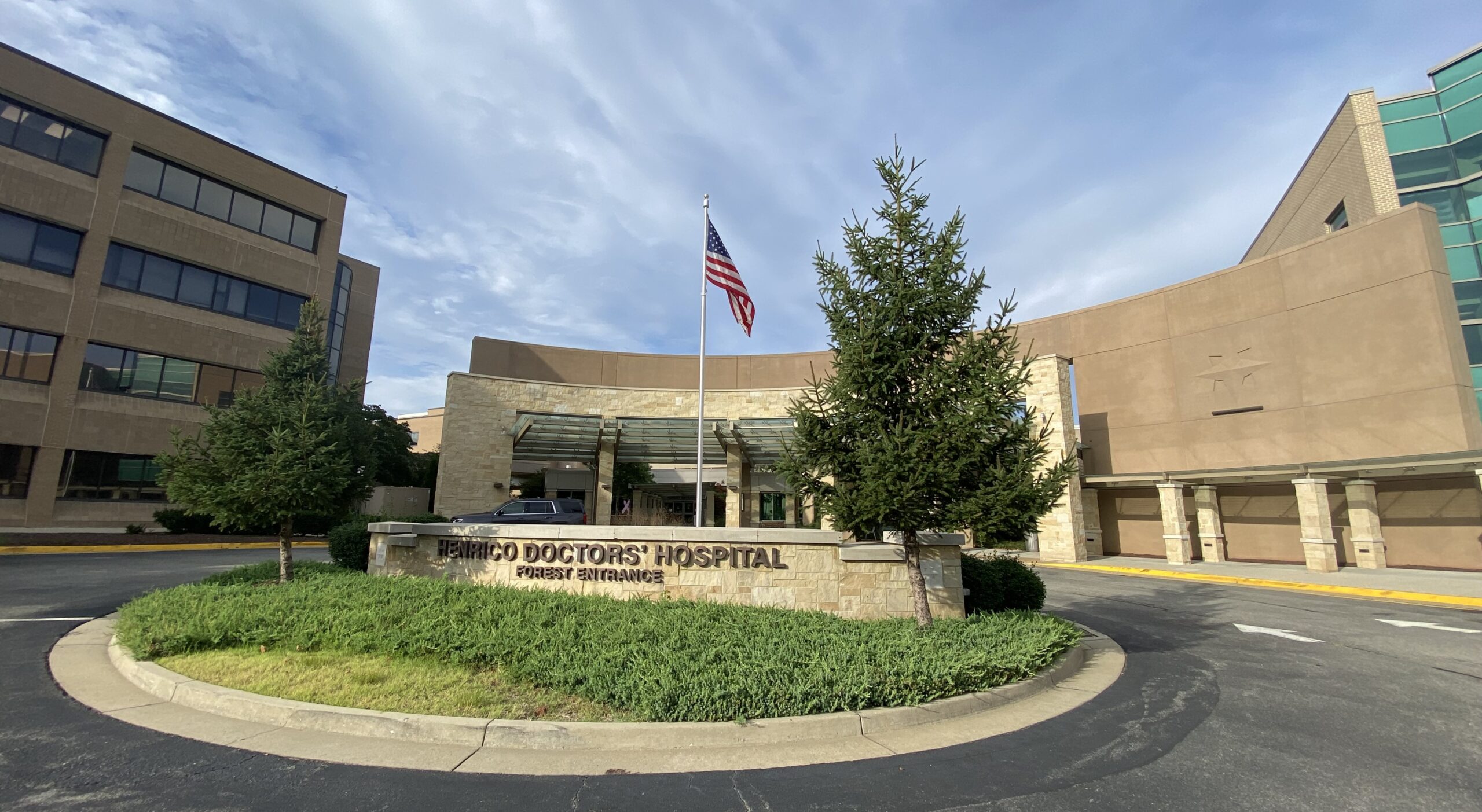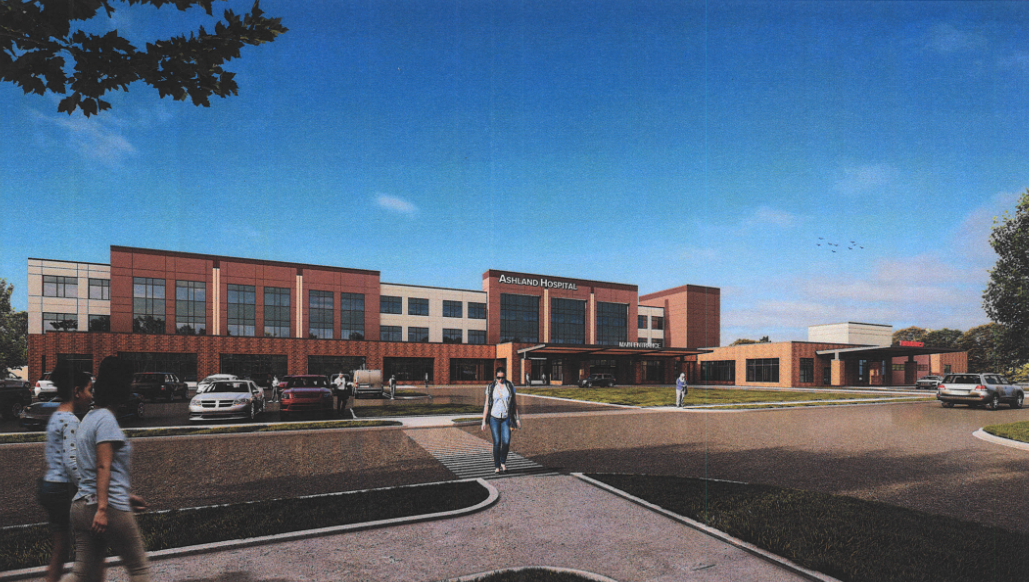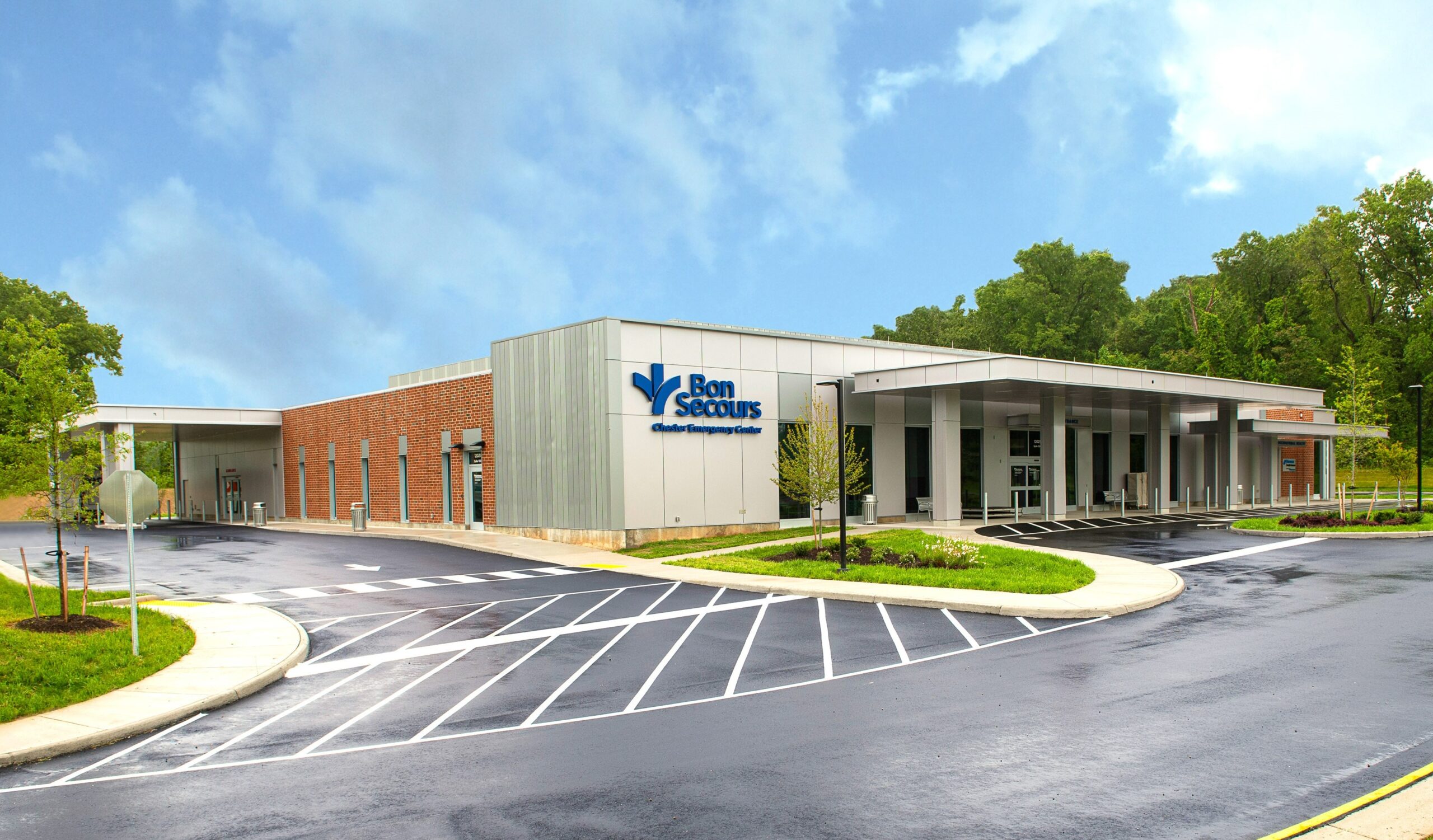
HCA’s proposed emergency center in Hanover County would be an arm of the health system’s Henrico Doctors’ Hospital at 1602 Skipwith Road, shown here. (Jack Jacobs photo)
Bon Secours and HCA clashed on Thursday as they navigate the state’s approval process for competing plans for new facilities in Hanover County.
The health systems each want to build new free-standing emergency centers with CT and MRI imaging machines within a few miles of each other south of Ashland.
Both projects are subject to regulatory approval and the companies presented yesterday before a state health department adjudicator, who will make a recommendation on what proposal should get final approval from State Health Commissioner Karen Shelton. The adjudicator’s consideration follows a lower-level staff recommendation last month to approve the Bon Secours proposal and reject the HCA project.
And while the dueling proposals were the subject of this week’s hearing, HCA’s additional, larger plans for a new hospital in Hanover loomed over the discussions.
HCA considers the emergency center as an alternative to the hospital and both projects are proposed for the same site at 10054 Sliding Hill Road.
Matthew Jenkins, a Hunton Andrews Kurth lawyer representing Bon Secours, took aim at HCA’s backup plan approach in his opening remarks at the hearing, attempting to draw a distinction between that proposal and a need to address rising demand at Bon Secours Memorial Regional Medical Center in Mechanicsville.
“The Bon Secours project is based on Memorial Regional Medical Center’s institutional need to have additional CT and MRI scanning capacity. And to decompress emergency-room demand on Memorial Regional’s hospital campus,” Jenkins said. “The project from HCA before you today is a stepping-stone project for a hospital. … HCA’s project is squarely aimed at increasing the market share in furtherance of HCA’s corporate strategy.”
Jenkins represented Bon Secours with colleague Elizabeth Breen.
Thomas Stallings of McGuireWoods, who represented HCA along with Katie Puccinelli, called the Bon Secours ER project an attempt to head off HCA’s desire to open a hospital in Hanover.
“I was struck today by how much of the Bon Secours presentation was designed to counter the Ashland hospital proposal, not so much to talk about the free-standing ER project,” Stallings said. “But that makes sense because from all appearances, the Bon Secours application was filed as a spoiler designed to serve as an alternative so the proposed Ashland hospital would never be built.”
Bon Secours Richmond COO Chris Accashian disputed that accusation, and said Bon Secours had been planning a stand-alone emergency center in Hanover since January 2022.
“We have been in the planning stages of this for quite some time,” he said during the hearing.
HCA filed its state application for the hospital in January 2023. The application Bon Secours filed for its Hanover emergency center followed in late March.

A rendering of HCA’s proposed new hospital near Ashland. The health system also has proposed a free-standing emergency center as an alternative project for the site. (BizSense file)
Accashian said Memorial Regional recently completed an expansion that added more than 40 new beds, which became operational in late July. Bon Secours says the hospital needs a support facility to provide additional imaging services and capacity to handle ER visits that don’t require a hospital stay.
“That additional capacity will address inpatient-bed needs well into the future. ER and advanced imaging utilization is also very high at Memorial. This current project request aims to address capacity constraints for CT (and) MRI as well as emergency services,” Accashian said.
Accashian also argued that there isn’t a need for HCA’s new hospital, as the recently expanded Memorial Regional, which is now licensed for 269 beds, can handle future demand.
“With the additional beds, our occupancy is down to the mid-60s, which indicates that we have more than enough bed capacity to serve the needs for patients in our community long into the future. I’d say it’s premature to build a new hospital in Hanover when 44 (new) beds just became operational.”
Bon Secours now wants to build a free-standing emergency center at 11400 North Lakeridge Parkway, which the health system said was its initial site choice and a short distance from the project’s previously proposed site at 10080 Lewistown Road.
“We were ultimately able to negotiate with the seller of the land that we preferred in the first place,” Accashian said.

The Bon Secours Chester Emergency Center. Bon Secours is seeking to establish a new stand-alone emergency department in Hanover to join its other such facilities in the region. (BizSense file)
Henrico Doctors’ Hospital CEO Ryan Jensen argued that the HCA proposal should be approved because its site has enough space to transition into a hospital campus in the future, should the state decide a hospital isn’t necessary now.
“We have been clear all along that we believe the true public need is for Ashland hospital. … In the event that the commissioner determines only a free-standing emergency department should be approved at this time, our Ashland ER and imaging center would be a better option,” he said.
This week’s hearing, which is known as an informal fact-finding conference, is a regular part of the state’s approval process for certificates of public need (COPN). In Virginia, healthcare providers are required to submit applications to the regulatory program to get the state approval needed to operate certain medical equipment and facilities.
A final decision on the emergency-center proposals is expected in early November.
HCA anticipates that it will receive a final verdict from the state on its hospital proposal, which VDH staff has recommended be rejected, in early October.
The proposals by the health systems for free-standing emergency departments comes concurrently with HCA’s effort to acquire the necessary local approvals for the 60-bed hospital on the Sliding Hill Road property. HCA is working on a rezoning request with the county that would set the stage for development, which would include medical office space as well.
The anticipated timeline is that the Hanover Planning Commission will review the proposal in September, and the Board of Supervisors will render final local-level zoning approval in October.

HCA’s proposed emergency center in Hanover County would be an arm of the health system’s Henrico Doctors’ Hospital at 1602 Skipwith Road, shown here. (Jack Jacobs photo)
Bon Secours and HCA clashed on Thursday as they navigate the state’s approval process for competing plans for new facilities in Hanover County.
The health systems each want to build new free-standing emergency centers with CT and MRI imaging machines within a few miles of each other south of Ashland.
Both projects are subject to regulatory approval and the companies presented yesterday before a state health department adjudicator, who will make a recommendation on what proposal should get final approval from State Health Commissioner Karen Shelton. The adjudicator’s consideration follows a lower-level staff recommendation last month to approve the Bon Secours proposal and reject the HCA project.
And while the dueling proposals were the subject of this week’s hearing, HCA’s additional, larger plans for a new hospital in Hanover loomed over the discussions.
HCA considers the emergency center as an alternative to the hospital and both projects are proposed for the same site at 10054 Sliding Hill Road.
Matthew Jenkins, a Hunton Andrews Kurth lawyer representing Bon Secours, took aim at HCA’s backup plan approach in his opening remarks at the hearing, attempting to draw a distinction between that proposal and a need to address rising demand at Bon Secours Memorial Regional Medical Center in Mechanicsville.
“The Bon Secours project is based on Memorial Regional Medical Center’s institutional need to have additional CT and MRI scanning capacity. And to decompress emergency-room demand on Memorial Regional’s hospital campus,” Jenkins said. “The project from HCA before you today is a stepping-stone project for a hospital. … HCA’s project is squarely aimed at increasing the market share in furtherance of HCA’s corporate strategy.”
Jenkins represented Bon Secours with colleague Elizabeth Breen.
Thomas Stallings of McGuireWoods, who represented HCA along with Katie Puccinelli, called the Bon Secours ER project an attempt to head off HCA’s desire to open a hospital in Hanover.
“I was struck today by how much of the Bon Secours presentation was designed to counter the Ashland hospital proposal, not so much to talk about the free-standing ER project,” Stallings said. “But that makes sense because from all appearances, the Bon Secours application was filed as a spoiler designed to serve as an alternative so the proposed Ashland hospital would never be built.”
Bon Secours Richmond COO Chris Accashian disputed that accusation, and said Bon Secours had been planning a stand-alone emergency center in Hanover since January 2022.
“We have been in the planning stages of this for quite some time,” he said during the hearing.
HCA filed its state application for the hospital in January 2023. The application Bon Secours filed for its Hanover emergency center followed in late March.

A rendering of HCA’s proposed new hospital near Ashland. The health system also has proposed a free-standing emergency center as an alternative project for the site. (BizSense file)
Accashian said Memorial Regional recently completed an expansion that added more than 40 new beds, which became operational in late July. Bon Secours says the hospital needs a support facility to provide additional imaging services and capacity to handle ER visits that don’t require a hospital stay.
“That additional capacity will address inpatient-bed needs well into the future. ER and advanced imaging utilization is also very high at Memorial. This current project request aims to address capacity constraints for CT (and) MRI as well as emergency services,” Accashian said.
Accashian also argued that there isn’t a need for HCA’s new hospital, as the recently expanded Memorial Regional, which is now licensed for 269 beds, can handle future demand.
“With the additional beds, our occupancy is down to the mid-60s, which indicates that we have more than enough bed capacity to serve the needs for patients in our community long into the future. I’d say it’s premature to build a new hospital in Hanover when 44 (new) beds just became operational.”
Bon Secours now wants to build a free-standing emergency center at 11400 North Lakeridge Parkway, which the health system said was its initial site choice and a short distance from the project’s previously proposed site at 10080 Lewistown Road.
“We were ultimately able to negotiate with the seller of the land that we preferred in the first place,” Accashian said.

The Bon Secours Chester Emergency Center. Bon Secours is seeking to establish a new stand-alone emergency department in Hanover to join its other such facilities in the region. (BizSense file)
Henrico Doctors’ Hospital CEO Ryan Jensen argued that the HCA proposal should be approved because its site has enough space to transition into a hospital campus in the future, should the state decide a hospital isn’t necessary now.
“We have been clear all along that we believe the true public need is for Ashland hospital. … In the event that the commissioner determines only a free-standing emergency department should be approved at this time, our Ashland ER and imaging center would be a better option,” he said.
This week’s hearing, which is known as an informal fact-finding conference, is a regular part of the state’s approval process for certificates of public need (COPN). In Virginia, healthcare providers are required to submit applications to the regulatory program to get the state approval needed to operate certain medical equipment and facilities.
A final decision on the emergency-center proposals is expected in early November.
HCA anticipates that it will receive a final verdict from the state on its hospital proposal, which VDH staff has recommended be rejected, in early October.
The proposals by the health systems for free-standing emergency departments comes concurrently with HCA’s effort to acquire the necessary local approvals for the 60-bed hospital on the Sliding Hill Road property. HCA is working on a rezoning request with the county that would set the stage for development, which would include medical office space as well.
The anticipated timeline is that the Hanover Planning Commission will review the proposal in September, and the Board of Supervisors will render final local-level zoning approval in October.



Oh no! Too many hospitals, too close to one another, that’s bad for the community.
Come on, if these businesses want to open for emergencies, just let them. The worse thing to happen, will be they will close if they don’t make enough money. Sheesh…
This is exactly what my initial thought was – why is government deciding winners and losers? If they both meet zoning requirements – let the marketplace decide if there are too many hospitals.
This competition is a good reason why Virginia should abolish the Certificate of Public Need (COPN). The COPN simply constrains competition which increases patient costs.
A counter argument is – one purpose of boards for local government is to keep developers and commercial interests from making a quick buck and having an epidemic of empty failed commercial spaces that turn an area into an economic ghost town of developed but unused spaces. *See Stony Point Mall……
Also in theory one goal of regulation is making sure all the facilities aren’t only in the most affluent/profit-producing areas.